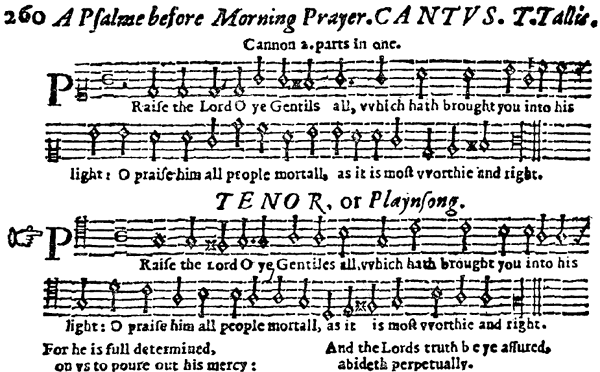Music has always played a big part in my life. From the time I was about 3 and crawled up on the piano bench to pick out by ear the songs my brother was laboriously trying to learn until now, there have been very few times in my life when music was absent. Those absent times were very long, painful periods where things weren’t going well and my spirits were about as low as a snake’s belly in Death Valley.
I discovered early that I was naturally attuned to renaissance and baroque music. I was exposed to more and more of it as I grew up, singing in church and school choirs and finally in our college choir. I never wanted to be a soloist; singing in a very large group was meat and potatoes as far as I was concerned. When I rejoined a church choir after a number of years away from the church, I lucked into finding one that frequently sang baroque compositions, Byrd and Tallis among them. There are a number of their compositions on my iPod today, and I don’t really ever tire of hearing them.
The three composers we celebrate today — Byrd, Merbecke, and Tallis — were all English composers who lived around the same period of time and who helped Anglican church music grow from plainchant and simple tunes more complex melodies and harmonies of psalms, anthems, and service music. For several centuries these were gradually forgotten but a revival of interest in them during the 19th century brought them back into public notice. An interesting sidelight is that both Byrd and Tallis remained basically Roman Catholic but musically bridged the gap with the Anglican church.
Byrd and Tallis gave us masses and settings to various scriptural passages to accompany the readings through the church year. Merbecke gave us the first Anglican settings for the Psalms in English, following in a slightly more Calvinist form of composition. The three together, though, gave the English church a tradition of musical repertoire and presentation that we can still enjoy. Listening to various Evensong services on the BBC radio station or Lessons and Carols on CDs sung by cathedral choirs from all over England and even the US continues this tradition. On their tours of Britain, many tourists visit the great cathedrals for the Evensong services, even if they never enter a church door at any other time. Hearing clear, pure voices raised in glorious counterpoint resounding off great stone pillars and vaults can be a most uplifting spiritual experience.
Many people have said that they were drawn to the Anglican/Episcopal church because of the liturgy and also the music. It is a chance to see and hear things that are different from the everyday, hear-it-in-the-street kind of stuff. Many wander into these churches for the music and stay because it speaks to them in a way that draws them closer to God. That’s precisely what the music of the church is supposed to do, at least in my opinion. Come to think of it, that’s the purpose of the church too, isn’t it?
I give thanks not just for Byrd, Tallis and Merbecke, but for all artists and musicians who strive to bring beauty and glory to the worship of God in God’s church. I hope their gifts and talents will always be welcomed and cherished as expressions of worship which we can appreciate and which will bring us closer to God ourselves.
O God, whom saints and angels delight to worship in heaven: Be ever present with your servants who seek through art and music to perfect the praises offered by your people on earth; and grant to them even now glimpses of your beauty, and make them worthy at length to behold it unveiled for evermore; through Jesus Christ our Lord. Amen. – BCP p 819.
Linda Ryan co-mentors 2 EfM Online groups and keeps the blog Jericho’s Daughter . She lives in the Diocese of Arizona and is proud to be part of the Church of the Nativity in North Scottsdale
Image: Tallis Canon Morning Prayer

